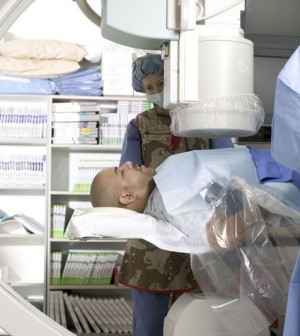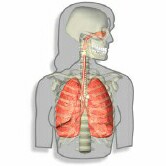- Could Your Grocery Store Meat Be Causing Recurring UTIs?
- Are You Making This Expensive Thermostat Error This Winter?
- Recognizing the Signs of Hypothyroidism
- 10 Strategies to Overcome Insomnia
- Could Artificial Sweeteners Be Aging the Brain Faster?
- Techniques for Soothing Your Nervous System
- Does the Water in Your House Smell Funny? Here’s Why
- Can a Daily Dose of Apple Cider Vinegar Actually Aid Weight Loss?
- 6 Health Beverages That Can Actually Spike Your Blood Sugar
- Treatment Options for Social Anxiety Disorder
Gene-Based Spit Test Shows Promise in Lung Cancer Detection


Medicare indicated recently that it might soon cover CT scans to check longtime smokers for early lung cancer, and these types of scans are becoming more common.
Now, an experimental test may help determine whether lung nodules detected by those scans are malignant or not, researchers say.
The test, which checks sputum (respiratory mucus) for chemical signals of lung cancer, was able to distinguish early stage lung cancer from noncancerous nodules most of the time, according to findings published Jan. 15 in the journal Clinical Cancer Research.
“We are facing a tremendous rise in the number of lung nodules identified because of the increasing implementation of the low-dose CT lung cancer screening program,” Dr. Feng Jiang, associate professor, department of pathology, University of Maryland School of Medicine, explained in a journal news release.
“However, this screening approach has been shown to have a high false-positive rate,” he added. “Therefore, a major challenge is the lack of noninvasive and accurate approaches for preoperative diagnosis of malignant nodules.”
Testing a patient’s sputum for a group of three genetic signals — called microRNA (miRNA) biomarkers — may help overcome this problem, Jiang said.
Jiang and his colleagues first tried the test in 122 people who were found to have a lung nodule after they underwent a chest CT scan. The sputum test was nearly 83 percent accurate in identifying lung cancer, the study found, and nearly 88 percent in correctly identifying when a lung nodule was not cancerous.
In two other groups of patients tested, the rates were about 82 percent and 88 percent, and 80 percent and 86 percent, respectively.
However, those results are still not high enough for the panel to be used for diagnosing patients, so more work must be done to boost accuracy, the researchers said.
“We are now applying new technologies to identify additional miRNA sputum biomarkers of lung cancer with the goal of expanding our biomarker panel to generate a test with high efficiency that can be practically used in clinical settings for lung cancer early detection,” Jiang said.
The study was funded by the U.S. National Cancer Institute, the U.S. Department of Veterans Affairs, and the LUNGevity Foundation.
Two experts in lung cancer agreed that the test shows promise.
“Invasive, unnecessary procedures may be avoided if this technology becomes available after more studies are completed,” said Dr. Len Horovitz, a pulmonary specialist at Lenox Hill Hospital in New York City. “This is an exciting forefront in diagnostic medicine,” he said.
Dr. Kevin Sullivan is a medical oncologist at North Shore-LIJ Cancer Institute in Lake Success, N.Y. He said that “with the rise in radiologic screening of heavy smokers for lung cancer using CT scans, a significant number of these patients will have solitary lung nodules for which the majority of these turn out to be benign.”
Therefore, he added, “many patients go through further invasive and anxiety-provoking tests to find out they ultimately did not have cancer. If testing sputum can help determine which patients should undergo further invasive procedures, this improves our ability to personalize therapies for patients.”
More information
The U.S. National Cancer Institute has more about lung cancer.
Source: HealthDay
Copyright © 2026 HealthDay. All rights reserved.










